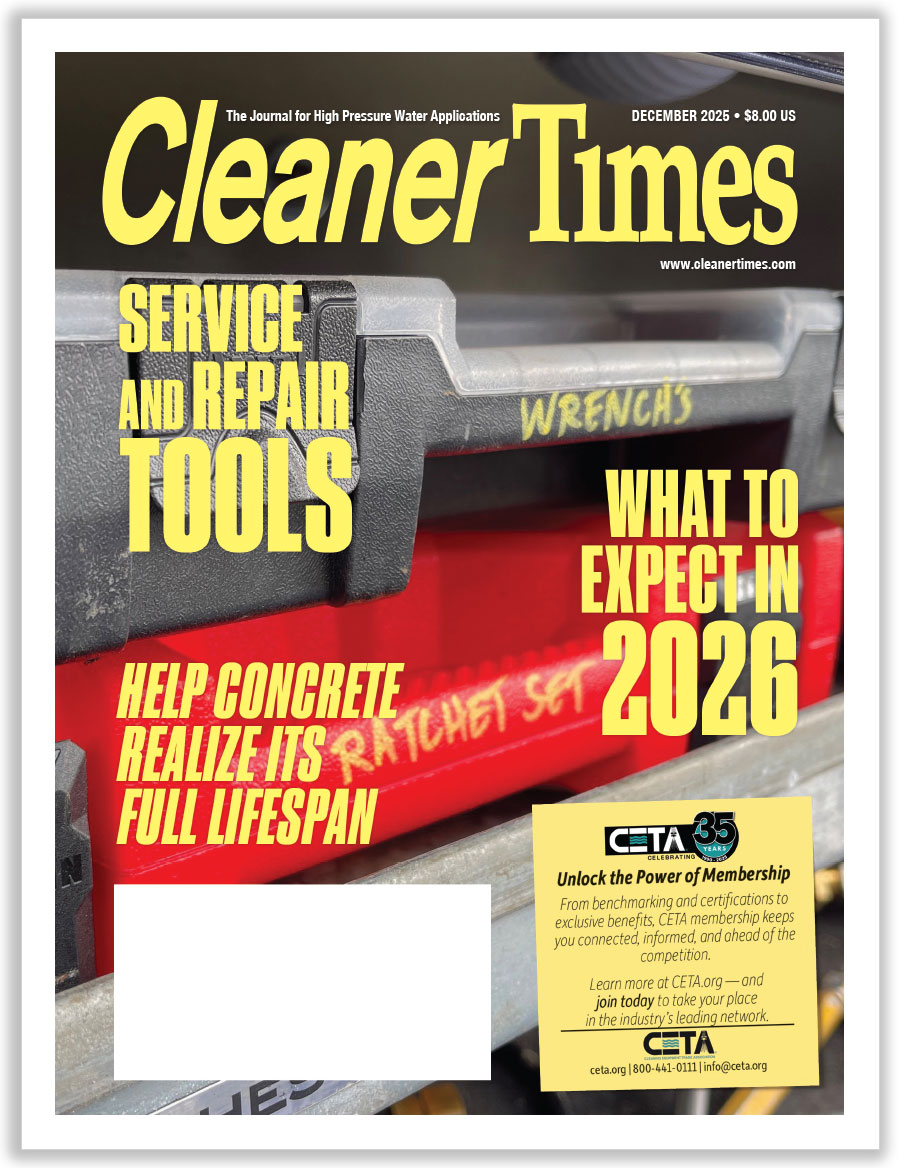
Financial
Responsible Person for Tax Penalties
By Mark E. Battersby / Published May 2019

The chances of having your tax returns—or those of your pressure cleaning business—audited continue to decline. However, with the IRS now targeting “issues,” payroll taxes are receiving far more attention. That attention to payroll, or trust fund, taxes means more and more “responsible persons” are getting hit with a whopping 100 percent penalty for failures to withhold and forward those taxes to the IRS.
One of the nastiest and most feared taxes currently imposed is the “Trust Fund Penalty Tax,” a whopping 100 percent penalty on payroll taxes withheld from the pressure cleaning operation’s employees but not forwarded to the Federal government. The fear stems from the IRS’s authority to assess the penalty on all “responsible parties,” a label that can include the owners, shareholders, partners, members, managers, and officers in the pressure washing business.
Quite simply, any person who has the authority to sign checks, control finances, etc., can be a “responsible person” for purposes of employment taxes. That means one or more individuals can be held personally responsible for withheld taxes that weren’t deposited with the IRS.
Both state and federal tax laws hold “responsible persons” personally liable for unpaid business taxes, particularly those so-called “trust fund” taxes collected from third parties, such as wage withholding from employees and sales tax collected from customers. Of course, being a responsible person doesn’t automatically establish liability for the employment tax. In a recent court case, liability attached based on the responsible person’s decision to pay salaries, utilities, rent, outstanding loans, or other business debts after learning of the business’s unpaid tax obligations is necessary to establish willfulness.
Confusion Among the Rules
Every business with employees is required to withhold payroll taxes from paychecks and to pay all applicable federal, state, and local taxes. The taxes usually withheld from employee paychecks include FICA (Medicare and Social Security taxes) and federal, state, and local income taxes. Other withholding obligations include FUTA (Federal Unemployment Tax Act) payments and, in several states, disability insurance taxes.
While some of these taxes are not payable by a pressure washing business, they must be collected as withholding and turned over to the IRS. These payroll taxes are called trust fund taxes by the IRS because the funds are held in trust. The IRS regards falling behind on filing and submitting payroll taxes as theft, since the funds never belonged to the business in the first place.
Payroll services are often thought to be an answer, taking away the employer’s discretion to use the money for other purposes. But what if the payroll service fails to collect or pay over the money?
Third-Party Payroll Services
When it comes to getting the pressure washing operation’s employees paid, it’s not just about keeping track of hours worked and cutting a few checks. Anyone not well versed in accounting or well versed in payroll processing may turn to an outside payroll service.
Most employers believe that if they pay income taxes and employment taxes into a vendor’s account or give a vendor authorization to withdraw income taxes and employment taxes from the employer’s accounts, then the income and employment taxes will be paid over to the IRS.
Unfortunately, there are all too many situations where actual vendor performance does not meet employer expectations. Worse, there are many times where an employer discovers that money set aside from employee income tax withholdings, and the employer and employee share of payroll taxes, does not get paid over to the IRS. Even worse, many employers are often shocked to discover that they, the employer, not the payroll service company, are liable for all unpaid income and employment taxes—even though the taxes were paid to the vendor or removed from the employer’s accounts by the vendor.
Who is Liable?
Whenever a shortfall occurs, the IRS will usually make personal assessments against all “responsible persons.” As mentioned, the IRS can assess the Trust Fund Recovery Assessment, also known as the 100 percent penalty, against every “responsible person.”
Anyone can be liable, even those with no knowledge that the IRS is not being paid. Once labeled as a responsible person, the IRS can and will pursue anyone personally if the business fails to pay.
An incorporated pressure cleaning business may protect the individual owner or shareholder from personal liability from some corporate debts. Not so when it comes to unpaid payroll taxes. The IRS can now bypass the corporate barrier to reach the person it labels as “responsible” to pay the debt.
In fact, in certain circumstances, outside parties such as lenders, attorneys, and accountants can also be labeled as responsible persons. Not too surprisingly, when multiple owners and signatories face tax bills and penalties, they generally do their best to point the finger at someone else. Facts matter in this kind of mud-wrestling but so do legal maneuvering and smart strategies. While one responsible person may get stuck, with others paying nothing, the government will often continue its attempts to collect from the pressure cleaning business that withheld on the wages.
Knowingly or Lawfully Guilty
It is the “unlawful retention” that forms the basis for the whopping 100 percent penalty tax—a penalty tax that accrues additional penalties and interest the longer it goes unpaid. The 100 percent penalty equals the taxes not collected and can be assessed against multiple responsible persons, allowing the IRS to pursue them all to see who coughs up the money first.
The IRS is required to prove a second element for liability under the trust fund rules. That element is “willfulness.” A responsible person need not have failed to pay the taxes with a fraudulent or evil purpose; that person must merely be shown to have knowingly and intentionally disregarded the duty to pay trust fund taxes to the IRS.
“Willfulness” can be best defined as “an act is willful if it is voluntary, conscious, and intentional.” A responsible person acted willfully if he or she “knowingly” used available funds to pay other expenses of the business instead of the withholding taxes.
The Loophole (Sort of)
When incorporated pressure cleaning businesses or those operating as LLCs (Legal Liability Companies) owe payroll taxes, it is only the trust fund amount, that portion made up of federal withholding, FICA, and Medicare that remains unpaid, that can be charged to a responsible party. The trust fund amount can be significantly less than the total owed by the pressure washing business. It is this amount that can be—and often is—charged to each responsible party that the IRS feels owes the tax.
The IRS would have everyone believe that anyone who has signature authority on the pressure cleaning operation’s bank account, signs checks, is a shareholder, signs tax reports, etc., can be held liable for the trust fund payments. The law, however, states that an individual who signs checks as a convenience to his or her employer, and who does so only when instructed but doesn’t have any authority to decide who, when, or how much to pay, is not a “responsible person,” providing a loophole of sorts.
And, under our tax laws, a Trust Fund Recovery Penalty must be assessed by the IRS within three years of the April 15th following the year during which the quarterly liabilities arose. If, for example, the penalty arose during 2018, it must be assessed on or before April 15, 2022. If the return is filed later than the April 15th following the year during which the liability arose, the statutory period for assessment is three years from the date of filing.
Reducing Payroll Tax Penalties
Payroll tax penalties can be devastating, but they can be avoided by ensuring all employment taxes are collected, accounted for, and paid to the IRS when required. Reducing payroll tax penalties levied as the result of an IRS audit or even resulting from errors detected by the pressure cleaning operation itself begins with simply asking the IRS to abate or eliminate the payroll tax penalty. Yes, they have the discretion to waive penalties, especially if the penalty is the exception, not the rule.
The Bottom Line
The IRS is becoming more aggressive in going after payroll taxes as evidenced by one recent case where one “responsible person” faced five years in jail for payroll tax violations. Today, lawmakers are urging the IRS to prosecute more payroll tax violations.
Everyone who participates in running a pressure washing business or any entity that has not paid over taxes withheld from employee paychecks runs the risk of the IRS labeling them a “responsible person” and assessing the 100 percent penalty. Combatting this designation begins with knowing the rules.
Understanding the basic rules for withholding payroll taxes—and paying over withheld amounts—on the wages of all employees in the pressure cleaning business is a good start. Checking the actions contracted for with a payroll service is also important. Overall, however, guidance and advice from a competent, qualified advisor is virtually a necessity.





